Confession #9: My son is guilty.
Facts, Not Feelings
I am a strong supporter of The Innocence Project and of Wrongful Conviction awareness, in general. Research-backed estimates place the number of falsely convicted United States citizens to be upwards of 200,000 people. While a significant problem that demands our consistent attention, I did not start a blog to build a case for my son’s innocence. He is not innocent.
He pled guilty because he was guilty of several U.S. criminal laws—
Do not collect $200. Do not pass Go.
We can all sleep better now, right?
No.
What he is guilty of has required an inquest of my soul. After years of tossing and turning at night (and reading and listening and studying), I have concluded that the laws which ushered my son through prison gates are not only unnecessary— they are fundamentally harming the rest of us.
Early in 2017, I knew that my son was careening toward bonafide addiction.
He had moved away from home to his first apartment, and he was working a full-time job. Slowly, his after work hours went from having a good time to something entirely different— inconsistent communication, avoiding family, appearance changes, his apartment in complete disarray. He had that smell. If you have ever loved an addict, you know the one.
Sadly, I was not surprised (nor particularly impressed).
Our family Bibles are chocked full of beautiful people who have been the life of the party. I was, once upon a time, one of them. My son and I were born into genealogies plagued by sins of the father. Written beside their names are the names of many mothers and grandmothers who struggled and enabled and died too young under the weight of their own unhealthy ‘coping.’
My son is far from the first black sheep in his bloodline. Those who aren’t in active addiction have control issues and sharp tongues and other harmful quirks of character.
Like so many American families, the generational trauma and individual cases of stormy mental health date back as far as our oral history goes. I have sat bedside, watching cherished loved ones die for their love of the bottle— and I have had to leave others behind in the quest for my own sobriety and sanity. While I am grateful to be completely sober after a recklessly spent youth, BUT for the grace of God, go I.
Early in my oldest son’s partying, I was pre-occupied with survival: a mom of three teenagers. I told myself that he needed to walk his path— that he would learn and mature; it was out of my hands. This was ‘youth’ and ‘foolishness’ and the ‘freedom’ of fresh adulthood. I blamed the messy apartment on myself (and his grandma) for “cleaning up after him” for too many years. I blamed the school that kicked him out for his wilding. I blamed the bad influences he was hanging around. I blamed his reckless girlfriend. I blamed his dawn-till-dusk work schedule. I figured, yeah, he was drinking a lot— but this is what we “all” did when we were young.
I wasn’t in denial; I was normalizing my own past behaviors.
One afternoon he called to tell me that he needed to talk— right now. He couldn’t come to the house; we had to meet elsewhere.
No stranger to his impulsivity and sudden need of something, I drove to a local coffee shop where he was already parked. He excitedly got into my passenger seat and proceeded to enlighten me of his numerous recent ‘epiphanies.’ We sat there and talked for a long while in a way that we never had. This was adult stuff; he was seeing life differently and he was trusting me enough to share his thoughts.
As mentioned before, I am a therapist. I have worked in community mental health, private practice, and school mental health offices for over 15 years; all of which have exposed me to countless individuals under the influence of all manner of drugs and alcohol. I am a trained professional and I was also, ah hem, featured in a 1990-something yearbook as the female “Class Partier”— a title that was, I assure you, hard won.
So— even though I am no stranger to the effects and outcomes of drug use, it took me about 20 minutes to figure out that my son was absolutely flying. But, this was a high that I did not recognize. There was no tweaking, no sniffles, no jaw movement, no fidgeting, no glazed eyes, no disconnected thought. He made incredible eye contact and laughed appropriately in a meaningful give-and-take conversation. He was bright, deliberate, and connected.
As he talked, I, hilariously, convinced myself that this was weed— some new kind of potent marijuana for which I had no reference. Weed these days ain’t like the schwag we rolled up. Silly mom—
It was actually meth.
Not knowing what he was on, I somehow convinced him to come to my house for “dinner” and then, it all unraveled. His talkativeness became rambling. Nonsense gave way to delusion. By midnight, he was puking and writhing on the bathroom floor. We spent that night— all night— in madness. The balloons, he kept saying, They are everywhere.
Late the next morning, I did what moms (and therapists) do— I tried to get him help. He crashed on my couch, literally. He was sorrowful and melancholy and asking for help. After two days of making calls and fighting insurance companies and putting $25k on credit cards, we got him into a drug treatment program 2,000 miles away. I bought him a plane ticket and took him to the airport (all the while neglecting my own work and other obligations), hoping that this was the answer to the ‘problem.’
It was not.
We would drive him to two other rehabs over the next few years, both of which he also left ‘unsuccessfully.’ One returned him to county jail from whence he had come. Thus began several years of the ping-pong game of help-relapse-help-relapse. I could not begin to total the costs of this season in our lives— it broke all of us.
For those in the “He Did the Crime, Do The Time” Camp, I get it.
He did.
And— if anyone has the right to be fed up, it is me. I have endured more than 10 years of ‘what the hell’ phone calls and sleepless nights. His dad and I, and his grandparents, have given over tens of thousands of dollars to help him— through direct expense and loss of work days and God knows what-all. I have aged 15 years in the last five. Merely writing about the outcomes of his addiction-fueled bs is exhausting— and I understand why some parents simply walk away.
In case there is ever a doubt, in no way do I excuse his behaviors nor a provide him a side-step of adult responsibilities by writing about this journey. But, if you want facts and not feelings: my son is doing the bulk of his state prison time at taxpayer expense for a 1/2 gram of methamphetamine.
It is a felony which carries a maximum penalty of 10 years in prison and up to $15,000 in fines.
The Crime
In the middle of a 5-day bender on methamphetamine, my son walked into a local store, put on a $15 pair of shoes, and tried to walk out. He had the money to buy them in his pocket, and he did not need a pair of shoes. Whatever he was doing that day, he has told me, was outside of his conscious control.
Security surrounded him.
He was escorted, high as a kite, to the little back room where the police were called and he was interrogated. He gave the shoes back and then consented to a search. Never one to lie, he told the police that they would find a gun in his pocket— and what do you know— they did. Does it matter that the gun was legally registered to him in another state? No— he was on probation which turned this incident into a felony weapons charge. It also overturned his previously suspended youth offender charges (remember the Facebook debacle?) and revoked his HYTA status.
At the advice of a seasoned attorney, he took a plea deal.
As part of his plea, he was assured that he would receive addiction treatment. The larceny charges, which initiated his arrest, were dropped. The recommendations of his probation agent, the court’s social worker, and the prosecutor were all unanimous: Long-term substance abuse rehabilitation would be the most appropriate course of action in his case. He needed help. The judge overseeing the larceny/weapons case agreed, but the judge from the county where he lived at the time (e.g., where his probation was overseen) did not agree. She (yes, a female) sent him to prison for 2-10 years for a probation violation and a previous meth possession charge. He “only” got 1-5 for the concealed .22.
He was on the van that morning to the state prison intake.
My heartache as a mom is one thing. Meth is the devil and I hate it more than anything else on this Earth. It has stolen my child from himself and from our family. It has cost him a decade of his life. It has forever altered our collective trajectory— and we will feel this season in our bones until our dying breath.
Addiction is, indeed, a family disease.
My frustration as a mom is another thing. There have been times that I felt maybe lock-up was the best option we had to keep him alive. He hasn’t “learned” any other way and rehab “didn’t work.” There have even been moments when I was thankful the entire thing had been taken out of my hands by the law. There was nothing else for me to “do.” I could only watch and wait while the state does whatever the state was going to do and my son responds as my son would.
BUT—
My anger that he is not receiving any help to address the source of his ‘crimes’ is a relevant emotion. No matter how I look at his charges and his current life, I cannot understand how my son’s incarceration is positively impacting society— unless, of course, paying DOC salaries is our top priority.
Frankly, none of us are better off today as a result of him being behind bars. Least of all, him. While you and I are paying $48k a year to keep him in a place that is compounding his emotional and psychological stress— the original source of his ‘criminal’ behavior— he is surrounded by substances and substance use.
Against the “Rehabilitate ‘Em!” smokescreen mission-statement of the DOC, he has been plunged into an environment that only exacerbates traumas and stigmas while fostering greater personal instability. Oddly, the DOC has also tried all manner of substances to keep him calm, subdued, sober, and sleeping— and then they punished him for taking these substances.
After this little experiment is over, he will come home to begin his visible life again, still fighting the urges of addiction while also climbing a wall to overcome the compounding disconnection and shame that comes from years of incarceration.
Now multiply him by 1.6 million other people.
85% of incarcerated individuals have substance use disorder or were incarcerated for drug-related crimes. There are 1.9 million people in U.S. prisons so, please, get out a pencil— and do some math.
Every 31 seconds someone is arrested in the U.S. for a drug offense. [Source]
We do not have a crime problem here.
We have an addiction problem.
We Have Lost the War
In America, we love a battle metaphor. As a history buff who gets goosebumps standing near historical landmarks, I am invested and deeply moved by our country’s origin stories. I love a good History Channel documentary. My version of fun is to drag my poor family through the tour— many years ago I took my children through a ‘historic’ five-floor, 516-cell, seven-block prison building.
Dear God, I paid money for that.
Under the cloud of our national ethos, we have internalized generational fears about the depravity of drug users (even the ones we love), and we have battened the hatches with lectures and campaigns and punishment. Our law enforcement has, for decades, been given marching orders and trained to fight a “drug war.” We celebrate shackles— and the social media comment sections are gross.
After more than 100 years of leadership by prohibition-leaning decision makers, it is now woven like a DNA strand into our battered collective identity:
Zero tolerance.
Drug-free school zones.
National Institute on Drug Abuse.
Partnership for a Drug-Free America.
Surveillance.
No-knock warrants.
Mandatory minimums.
Specialized Task Forces…
And we still have drugs in every neighborhood, every school, and every prison in this country.
Oh, sweet lil Nancy Reagan (a mom of an addict herself)—
We aren’t losing the war on drugs.
We lost.
We now incarcerate more drug offenders in the U.S. than the entire prison population in ALL western European prisons combined. We have never punished harder, and we have never had higher addiction rates in our history. Remember what happened in the 1920s prohibition era? We created the black market, the hiding, the smugglers, the cartels, and criminal factions and then we get mad when humans do what humans have always done.
Where the energy goes, the energy grows.
So— we can continue to make America’s drug problem a moral conundrum or we can stop being hypocritical. Drug addiction is not a personal failure— if so, we ought to out every person with a Starbucks account and confront our “glass a wine per night” moms right now. Diet Coke drinkers, you too, with your dependence on lab-created sweeteners. Benadryl and melatonin sleepers heads-up, you are all addicts. Adderall-fueled grad students and business execs, you can all immediately report to prison. Hey teachers, with your drip-drip-dripping coffee makers in the lounges of your ‘drug-free’ school zone— you’re guilty of two crimes.
Substance addiction is a common human status, be it considered “legal” or not. Seeking little helpers is the result of a shared vulnerability:
The nervous system is in need of attention.
Physiological systems are warning us to fix it.
Humans will set themselves on fire trying to feel better. The subsequent alarms should alert us to bring water, bring a ladder, get a blanket, summon the Red Cross and other humanitarian supports. Instead, we pour the gasoline of shame upon the “drug” addict and lock them in a cage. We strip them, assign them a number, take away their loved ones and autonomy and access to nutrition and then, WTH, expect healing to spring eternal from cinder block and steel bars.
This is eff-ing madness.
Drugs Inside
My son is currently sober, a factor of the story which I am pleased to share— Just For Today. His daily commitment to working toward a sound mind and sound judgement is his own and not the result of DOC miracles. It is a daily choice.
During his first few weeks of incarceration, he attended an ASAT (Advanced Substance Abuse Treatment) class for which he received a 8x10 computer-printed completion certificate. He mailed it home. I have looked at the programming content, and frankly, it equates to a basic recap of every in-house rehabilitation orientation that my son has ever attended. Nothing in this program offers new information for seasoned and habitual drug users (the people we incarcerate). The therapeutic value is, at best, questionable.
DOC substance abuse programming is merely a hoop to jump; a carnival game for the parole board. No one’s relationship to substance use is being profoundly altered within a violent, non-connecting, trauma-fueled, drug-filled environment. A study by the Bureau of Justice statistics showed that 76.9% of non-violent drug offenders were re-arrested within 5 years. [Source]
True Story— My son currently has access to any drug he would like to take. And while DOC loves to report that this is due to the ‘outside’ smuggling by family and friends, it is actually more likely thanks to the actions of corrections officers who seem happy to make prison drug use possible while lining their own pockets.
Ope, here’s another story of corrections staff bringing in drugs.
And another.
The above corrections officer got 5 years probation and no prison time for physically smuggling “33 grams of fentanyl pills, 1 gram of crack cocaine, 14 grams of powder cocaine, and Suboxone sublingual films, as well as cigarettes and a SIM card for a contraband cellphone” into a Massachusetts prison.
The internet is full of these stories from every state in the union (Google yours)— and the government still has the nerve to increase restrictions on innocent family members just trying to give their LO a hug during a monthly visit.
Frankly, our current corrections model does nothing about addiction; its about power and control. Which = abuse. To close with another battle metaphor, I will charge and die on this hill as long as I have breath—
Drugs are not the problem. Disconnection is.
For a deeper dive on addiction, I recommend the following books—
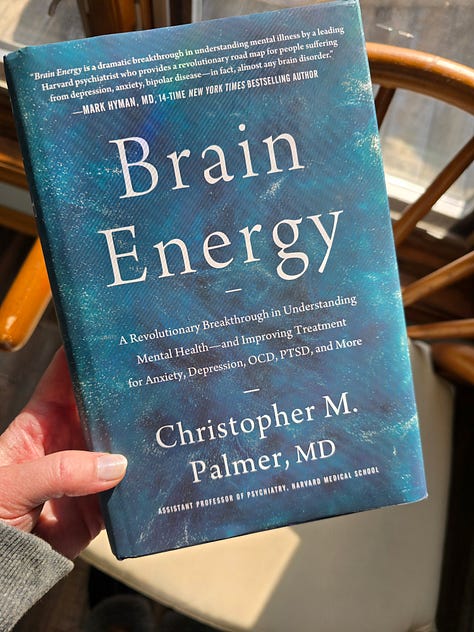
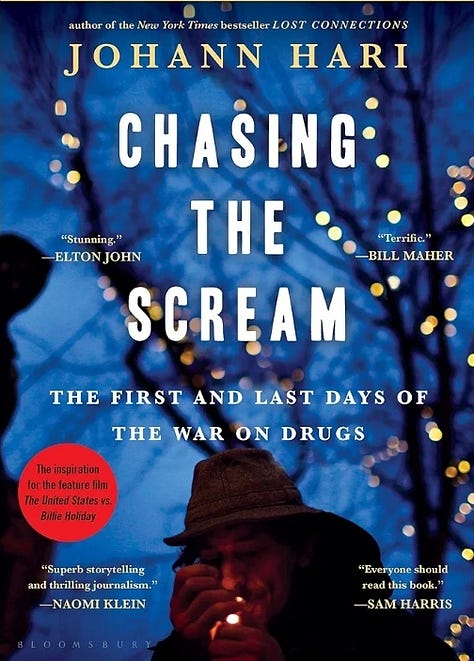
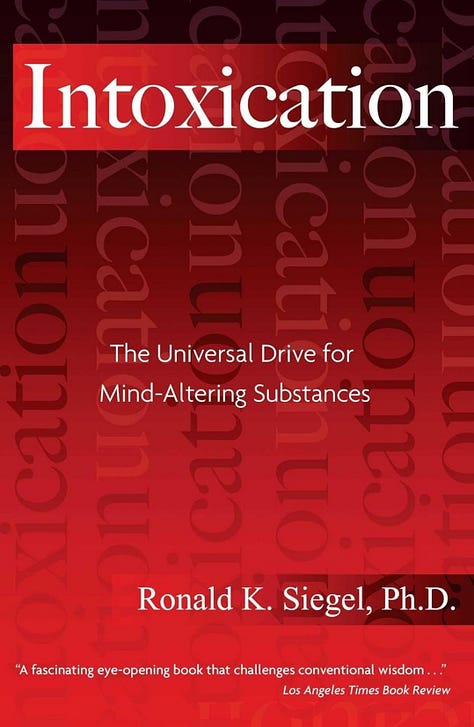

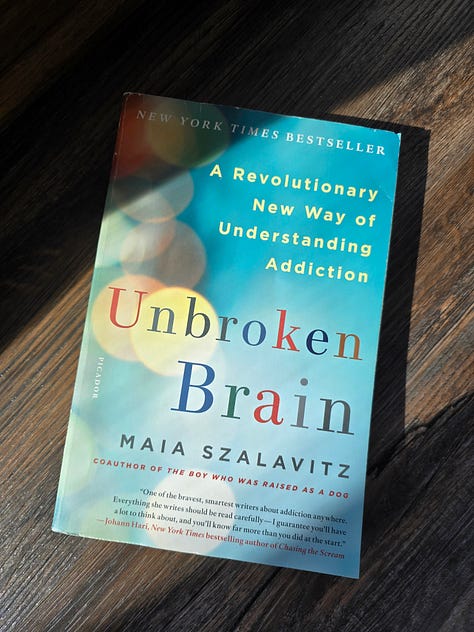

Brain Energy by Christopher Palmer, MD
Chasing the Scream by Johann Hari
Intoxication by Ronald Siegel, PhD.
In the Realm of Hungry Ghosts by Gabor Mate, MD
Narconomics by Tom Wainwright
Unbroken Brain by Maia Szalavitz
And… stay tuned in coming weeks for more posts about drugs, addiction, cartels, cops, alternatives to prison, and possibilities for change. This convo is just beginning. 🖤



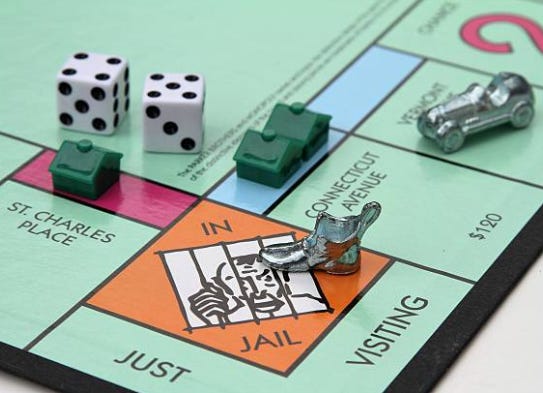


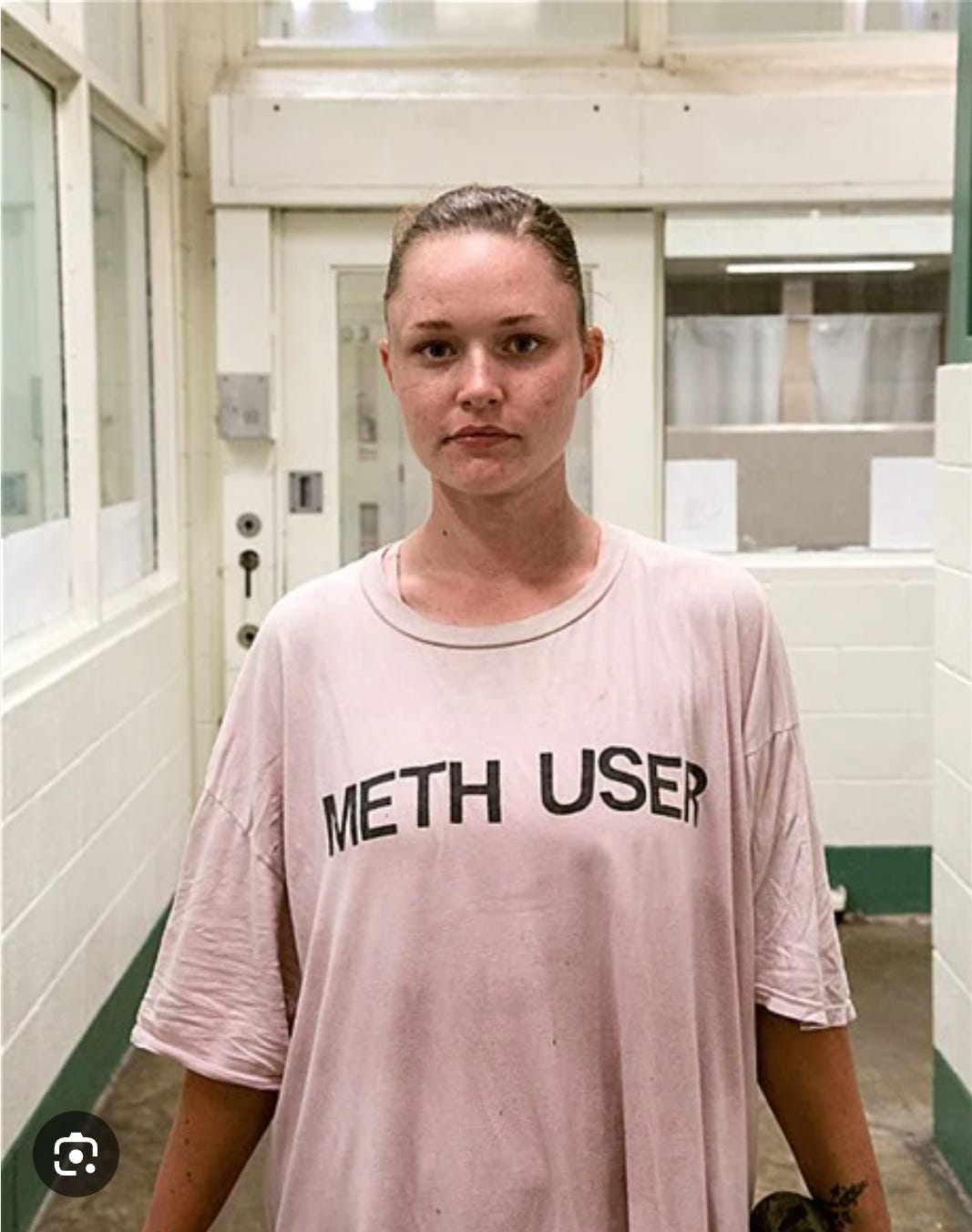

Thank you for reading, and for sharing with others who might need to know they're not alone. 🖤
Mind blowing (yet not). I don't know how I stumbled upon you - but I am glad I did Bridget. I had to go back and find the story. #1 - my heart breaks for you, your son, your family. I am glad you are writing (and btw, you are a very good, impassioned writer). My youngest son, 30, spends his days, working alongside the F.D. in San Francisco, mitigating calls for help with homeless/drug addicts, you name it. He left a "controlled" government sponsored "home environment, after four years, " with up to 15 "clients"/patients that essentially went nowhere after completing two years -- Some, ready for the hope of a new life and let down by our system, after filing reams of required paperwork -- if only to end up in a bed out in the middle of the central valley with an old couple. Now he's on the outside. I can't agree with you more and agree that something has to change. My best friend has a near 30 year old son with severe and chronic o.c.d. She can no longer get him into a rehab (when it's off the charts about once a year) unless "he's on drugs or alcohol as well." The system has looped mental health together with addiction -- full stop. She has exhausted herself. So he sits two years with a headset on, because he thinks he can't hear. He is not a substance abuser nor drinks alcohol. He is on meds obviously -- but she clearly wants rehab for him. There is nothing.
And the corrupt prison guards bringing in hard drugs to prisoners. Government corruption as old as the day. God Bless you. I pray everyday for things to change. ox